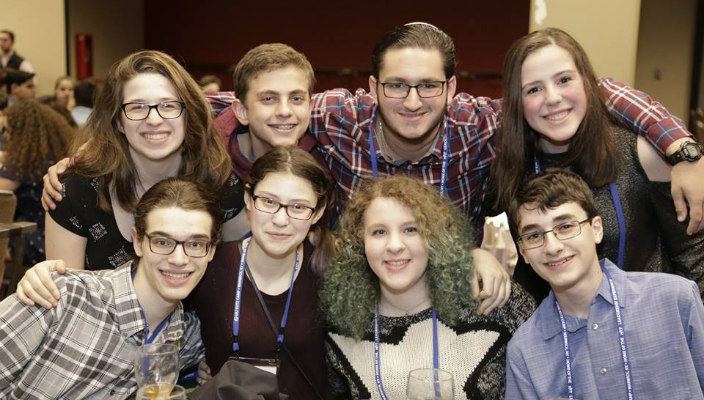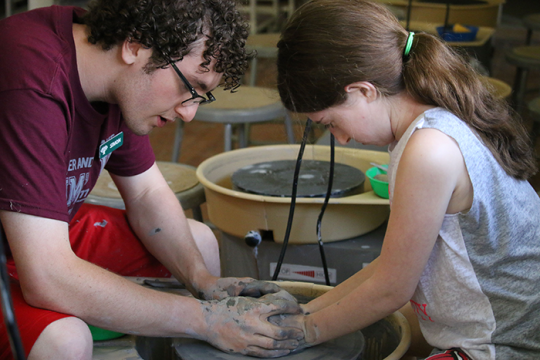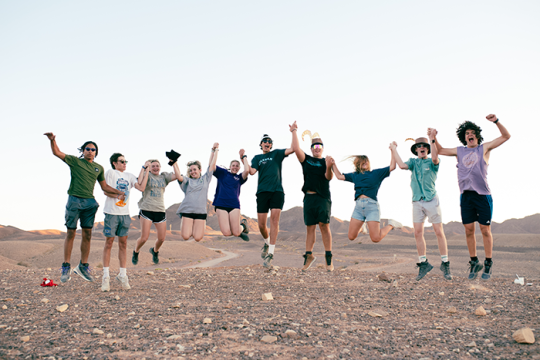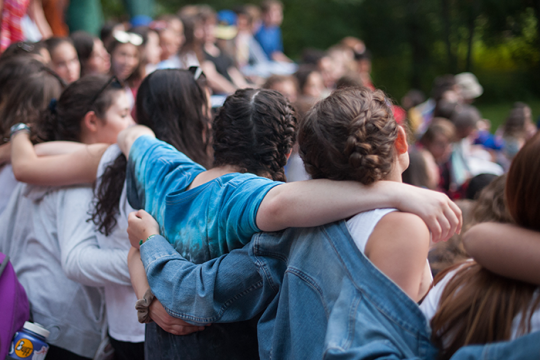
When I first startedmy job as the songleader and director of youth engagement for Isaac M. Wise Temple in Cincinnati, OH, I saw the words “Director of Youth Engagement" and thought, “All right, so I’m running the youth group” – and that was a pretty terrifying notion. I’d always been told that I was great at working with nursery school-aged children and should continue working with younger kids, so as I entered into a role working with teens, I had my doubts.
And so, as a newcomer to the URJ Youth Summit at NFTY Convention, I let the experience wash right over me, taking in inspiration, sparks, and ideas as they came. I found the space to be engaging, challenging, and filled with relationship. I use the word “engaging” here to as an intentional nod to the titles of many of my fellow attendees’ positions. We are the “directors of youth engagement,” “engagement coordinators…” you name it, we engage it!
We were also engaged by the programs themselves, and we engaged in the meta-processing of the experience. I, for one, felt challenged by the Youth Summit. Just as we call ourselves the People Israel, who struggle with God, so too do we also struggle and are we challenged by both new and familiar information – and there was a great deal of information presented at the Youth Summit, both by the presenters and the community, both formally and informally.
For me, though, the real gem in this experience was the relationship-building that occurred on-site. It is the heart of the youth engagement community and the work we do, and it is the spark of agency that will lead us to deepening our Youth Summit experiences back home.
When I started my position last September, I was one of many Jewish young professionals gearing up for similarly titled positions all around the country – though I didn’t really know this until the end of that month, when we all assembled at URJ Kutz Camp for a congregational connections retreat. I figured it would be an opportunity to learn what the word “engagement” really meant in the context of my new role.
Going to Kutz certainly help me unpack the term, and I gained a better sense from the Youth Summit, where I experienced two moments when I really “got” the work of engagement. The first was when I attended a technology-themed session and heard from teens about the power of unplugging for Shabbat and the presence that comes with doing so.
The second moment happened inside my own head during a few moments of the summit; it was the feeling of being disengaged. We’ve all had that kind of moment – when someone is talking to (or at) you, and you let your mind wander. I didn’t mean to tune out, but it turned out to be a worthwhile experience: I realized it was a feeling similar to how my teens must sometimes feel, even during events that I’ve organized or coordinated for them. I found myself struggling with this realization, wanting to challenge how we do things at my congregation – how I do things.
During the Youth Summit, we spoke a lot about social justice with our teens; the term echoed throughout the ballroom and into all of our NFTY teens’ consciousness. During this time when we are moved to stand for what we believe, it’s important we recognize the opportunity for growth – especially in our own organizations. I believe that the URJ Youth Summit and NFTY Convention served as a base camp. Of course, there’s much to celebrate about base camp: You’ve arrived at the table, and everyone is chatting with one another. There’s friendship, bonding, even drinks passed around; it was a blessing to see it and experience it all. It was an opportunity to see the summit ahead, and we got a good look at that summit from the bottom.
Meanwhile, we took a look around and met one another – and for me, the success of the Youth Summit was the relationships it helped to create. As soon as I arrived, I spotted fellow youth professionals whom I’d met at Kutz Camp just six months earlier. I was so moved by all of their greetings, and we spent our three days together truly deepening our friendships. During a panel with Rabbi Rick Jacobs and Evan Traylor, URJ Presidential Fellow for Millennial Engagement, Evan repeated used words like “relationship” and “mentorship.” Throughout the weekend, we spent a good deal of time discussing these words, and I couldn’t help feeling that we were like Noah and his struggle with his ship, that it’s what we board every time we meet someone new: a relation-ship, a mentor-ship, a friend-ship. This is what lies at the summit.
After three days at the URJ Youth Summit, I left feeling both engaged and ready to engage, both challenged and ready to challenge. I look forward to continue building ships of all kinds, together with my colleagues, congregational families, and especially my teens.
Ben Pagliaro is the songleader and director of youth engagement for Isaac M. Wise Temple in Cincinnati, OH.
Have something to say about this post? Join the conversation in The Tent, the social network for congregational leaders of the Reform Movement. You can also tweet us or tell us how you feel on Facebook.
Related Posts

Embracing Jewish Identity, Learning to Lead: The Lifelong Benefits of Working at Summer Camp

Empowering Tomorrow: The Enduring Impact of Youth & Teens in Reform Judaism's 150-Year Journey
